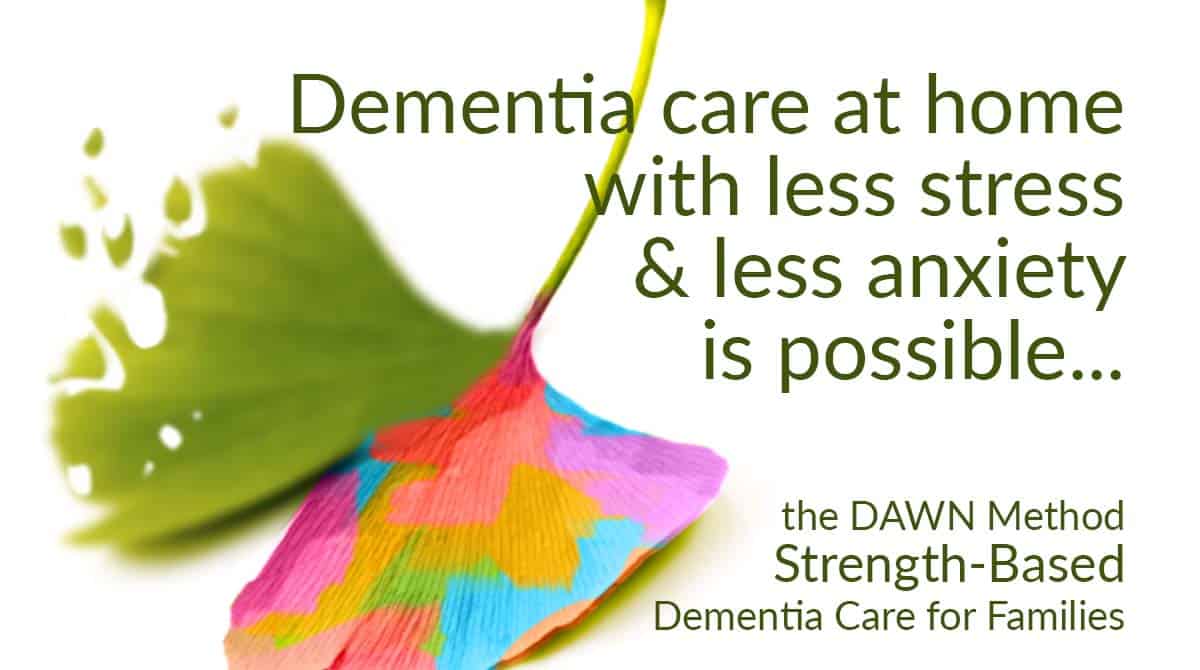What to do when a parent with dementia refuses help
People who have dementia often refuse care. We misjudge the situation if we assume that they are being difficult or are in denial. Often it is because they simply have become unable to be aware of their impairments—in part due to their loss of rational thinking skills (i.e. analysis).
The first step in designing dementia care is to be sure that assistance is being offered in a way that allows the care recipient to maintain dignity and a sense of control, so it’s important to take into consideration the possibility that the person is unable to perceive his or her disabilities.
Anosognosia definition
The condition of being unaware of physical or cognitive impairment is called anosognosia. I first encountered it when working in vocational rehabilitation with people who had traumatic brain injuries, and then again when I worked with the mentally ill, so I wasn’t surprised when many of my dementia clients exhibited it as well.

Degrees of anosognosia
When I began working with people experiencing dementia, I found that someone might recognize one impairment, like forgetfulness, yet be completely unaware of something more dangerous, such as faulty judgment or poor attention span. One of the most extraordinary cases of anosognosia I’ve dealt with was a man who had no teeth but was unable to realize it. He would order steak and then be outraged that the restaurant had served him meat he could not chew.
One of the first assessments we do when taking on a new client is to evaluate whether and to what degree anosognosia is present. People who know they are cognitively impaired, or who recognize they are losing the ability to take care of themselves, are sad and fearful—a sensible response to realizing that you are becoming unable to make sense of the world. For these people, being offered help eases their anxiety.
How to support their independence
Other clients are aware that they need help in some areas, but not all. They tend to think their families are overreacting and interfering. They may become paranoid or secretive as they attempt to hide their failings and retain the level of independence any normal adult expects to have. With these clients, we often begin by offering just transportation to do errands. We also assure them that we’ll help them stay as independent as possible.
By offering support that helps them preserve what they most desire—their independence—we gradually build a trusting relationship and unobtrusively provide assistance they can accept without sacrificing dignity or self-respect. We find that these people, with partial anosognosia, gradually accept more and more care.
“Caregiving by stealth” for dementia
When someone is not aware at all of any cognitive impairment, we use what we call “caregiving by stealth.” In these cases, we introduce a caregiver as a friend who just happens to enjoy the same activities and just happened to be in the neighborhood about to run an errand that would be more fun with a companion. We ensure safety and provide for their needs indirectly (sending in another caregiver while the client is out with his or her new “friend,” so we can keep the home clean and stocked with food). Without rational thought, it doesn’t occur to someone who has complete anosognosia to question such things as laundry that stays clean or a new friend that enjoys running errands with them.
When people cannot comprehend their own limitations, we shouldn’t expect them to make good decisions about needing care. It’s up to us to offer care in a manner they can accept.
Is there a better way to navigate dementia?
The odds are against you if you rely on your gut. Working with people who are experiencing dementia requires a new way of interacting. Family members and caregivers (even incredibly empathetic ones) who don’t truly understand this will inadvertently embarrass, frustrate or undermine their loved ones and clients. Learn why that is and how to navigate dementia more successfully in our DAWN Method courses and books.
Are you a family member?
Are you a professional caregiver or organization?
§
FAQs about anosognosia dementia
What is anosognosia dementia?
The condition of being unaware of physical or cognitive impairment is called anosognosia. It can be caused by dementia, traumatic brain injuries, and other medical conditions. It might also be referred to as “self unawareness.” It is not surprising that people with dementia often also experience anosognosia because they are losing rational thought and part of that is knowing “why” things are the way they are. A person with anosognosia and dementia is more likely to refuse care because they won’t think that they are impaired. Anosognosia may cause them to be paranoid and think that other people are the problem. Helping a person with anosognosia and dementia is most effective if the techniques used help the person maintain a sense of dignity and a sense of control over their life. We teach these sorts of techniques as a part of the DAWN Method of dementia care.
What should I do when my parent with dementia refuses care?
If a person with dementia refuses care, it may be that they do not even realize that they have dementia. This condition of not knowing that you are impaired is called “anosognosia.” There are a number of things you can do to provide “caregiving by stealth.” One is to introduce a new caregiver as a friend who happens to be in the neighborhood and is running an errand and would like some company. While they are on the errand, a second caregiver can come into the house to clean it and stock it with food. The DAWN Method of dementia care teaches this and other techniques to help someone accept care in a way that maintains the dignity of that individual.

